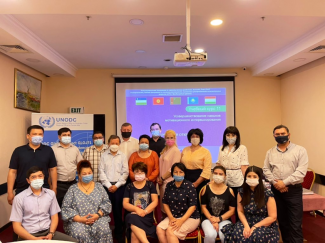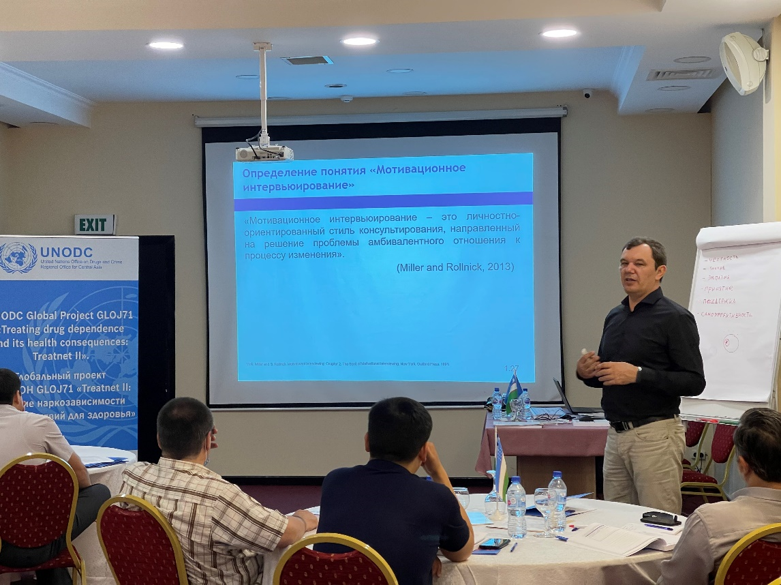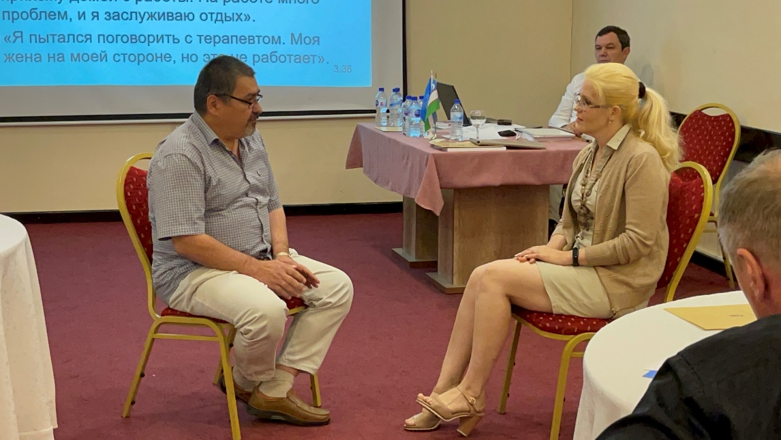UNODC Keeps Supporting Quality Drug Treatment Service via Continuous Capacity Building

UNODC Regional Office for Central Asia supported regional training of trainers (ToT) on Course 11 “Enhancing Motivational Interviewing Skills”. This course is part of the Advanced Level of the Universal Treatment Curriculum for Substance Use Disorders (UTC training package) for national trainers from Tajikistan and Uzbekistan which took place offline in Tashkent, Uzbekistan on 24-28 May 2021.
16 members of national teams of trainers from Tajikistan (5) and Uzbekistan (11) took part in the training. The main objectives of this training were to provide a comprehensive understanding of the role of motivational interviewing (MI) on a continuum of recovery-oriented interventions and to present ways of integrating MI techniques into a comprehensive system of treatment and care.
“Historically, motivation was viewed as a prerequisite to treatment. It was either there or not. When it was not seen by clinicians, clients were treated as “resistant” and labeled unmotivated. A growing body of research and clinical studies shed light on a new perspective on motivation and how people change maladaptive and/or unhealthy behaviors. Motivational Interviewing is both a treatment philosophy and a set of methods employed to help people increase internal motivation by exploring and resolving ambivalence about behavioral change. In the past decade, MI has become a well-recognized brand and has been used in psychotherapy, medicine, addictions, public health, and beyond,” said Mr. Borikhan Shaumarov, UNODC Regional Programme Coordinator in his welcoming speech.

During the training, regional master trainers explained the “spirit” of MI, its key elements and concepts, described the guiding principles, illustrated ways to respond to client’s change talks, and demonstrated the MI strategies and techniques.

“I am participating in such a practical training for the first time,” says Rumiya Marasulova, from ”Intilish” NGO that provides psycho-social support to the most vulnerable groups. “I can find no words to describe how great it feels when you get so much of helpful practical advice, gain structured knowledge that builds confidence and motivation.”
“It’s a unique opportunity to be a part of such training. It is the energy, the fascinating discussion, and exchange that makes it unique and insightful”, says Naimjon Malikov, addiction professional from Republican Clinical narcology Centre from Tajikistan.
This training was organized within the framework of UNODC global project GLOJ71 “Treating drug dependence and its health consequences: Treatnet” in collaboration with Sub-programme 3: Drug prevention, treatment and reintegration and HIV prevention of the UNODC Programme for Central Asia for 2015-2021 and Prevention, Treatment and Rehabilitation Section, UNODC HQ with financial support from U.S. Department of State’s Bureau of International Narcotics and Law Enforcement Affairs.
